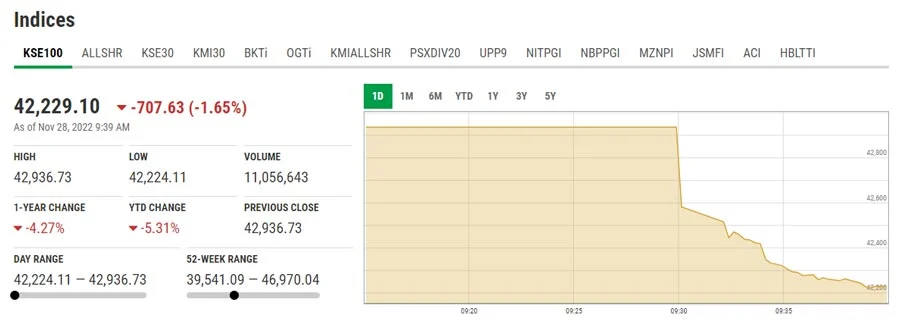
KSE-100 index falls by over 950 points; experts blame SBP’s pronouncement to upsurge interest rate
The Pakistan Stock Exchange (PSX) stormed open on Monday morning in response to the State Bank of Pakistan’s (SBP) surprise hike in interest rates to 16%, the highest level since 1999, at the market close on Friday.
The benchmark KSE-100 lost 707 points or 1.65% as the trading week began. At 9:39, the market was at 42,229 points. In the last session on Friday, it closed at 42,936.73 points.

The market saw a transitory regaining, but it stayed in the undesirable territory, with the bears ongoing to dominate and taking the market downcast by 969 points at 2:19 pm.

Analyst Samiullah Tariq identified the SBP’s decision to hike the interest rate as a critical factor behind the decline in the KSE-100 index.
“The market didn’t expect the rate hike. That’s why it’s responding,” the head of inquiry at the Pakistan-Kuwait Investment Company said to the reporters.
Markets were closed when announced the decision, so the KSE-100 index went red at today’s opening.
Capital markets expert Saad Ali also blamed the decline on a “surprise hike in interest rates,” adding that investors can expect further hikes given the inflation outlook.
“Interest rates of 16% or higher are significantly negative for a company’s growth and profitability,” Ali told The News.
SBP hikes interest rate to 16% to reduce inflation
On Friday, the Monetary Policy Committee (MPC) of the SBP elevated the key financial rate by 100 basis points to 16%, the peak ever since 1999.
The central bank said in a statement issued after the meeting that the decision reflected the MPC’s view that inflationary pressures had become more robust and persistent than expected.
The MPC said, “This choice is to guarantee that high inflation does not take root and that risks to economic stability are controlled, paving the way for higher growth on a more sustainable basis.” The SBP noted that inflation is increasing during the current economic slowdown, driven by persistent global and domestic supply shocks pushing up costs.